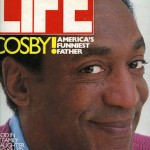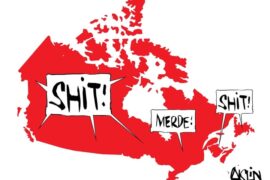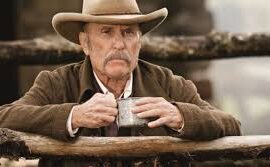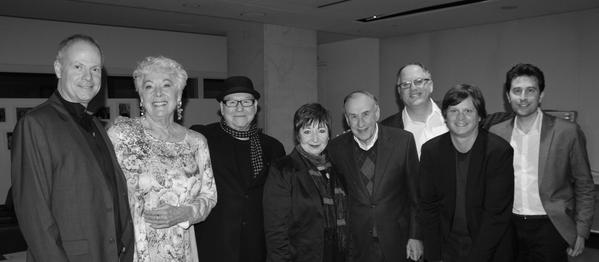
Anyone who still thinks Canada never had a “Golden Age” of television should have been at Sunday’s Canadian International Television closer.
I had the great pleasure of hosting the Sunday afternoon “Out of the Vault” panels. Thanks to CITF organizer David Heath. Lindsey Vodarek and all at the Bell Lightbox for putting together 10 full days of TV goodness.
Folks who came out Sunday saw clips from the 1967-68 CBS fall lineup, including scenes from Gentle Ben and He & She, both rookies that year. (We were supposed to see CBS’s 1970 reel with Mary Tyler Moore but there was a mix up; look for word here as to where and when that will be screened at a future TV on Film project gathering.)
A huge thanks to Royal Canadian Air Farce producer Mark Selby for sourcing a “lost” episode of Party Game–featuring the pre-Farce “Jest Society” trio of Don Ferguson, Roger Abbott and Luba Goy as the visiting team–as Sunday’s second feature. On hand was Party Game Home Team legend Dinah Christie, who spoke with warmth about deceased colleagues “Captain” Jack Duffy and Billy Van, as well as host Bill Walker. Goy–back for another Farce New Year’s Eve special Dec. 31–also took questions.
Christie explained they shot five episodes a day of the CHCH series, for the most part in a Hamilton theatre. They did break for lunch after three shows, and there may have been a cocktail or two consumed during the day, Christie allowed. Party Game, which came on the air when I was in Grade Eight, always looked to me like the best adult party ever. Christie insists nobody got too over-served, however, because there was that drive back along the Gardner Eastbound.
Christie stuck around for the next screening, which was another gem Selby dug out of the CBC archive–a 1965 episode of This Hour Has Seven Days.
advertisement
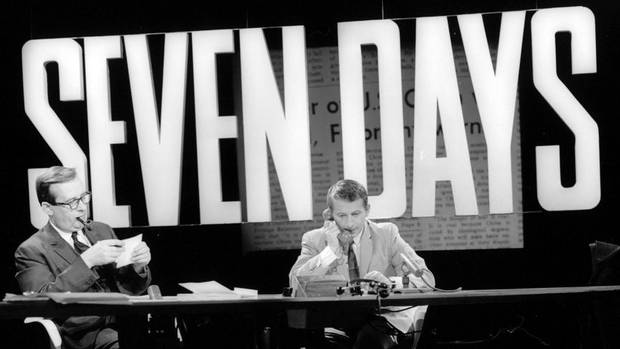
The landmark news magazine was decades ahead of its time. Think 60 Minutes mashed together with The Daily Show. Inspired by a similar seriesd airing in The U.K., 7 Days was bracing, uncompromising television. Politicians and movie stars were ambushed. Hosts Patrick Watson and Laurier LaPierre worked the desk while the represented Canada’s two solitude’s they were united in their quest: serve the truth straight up and make everyone in Canada squirm.
That included the politicians of the day. It was election time, and an empty chair was shown along with hundreds of letters from Canadians. Would any of the leaders have the guts to come on 7 Days and take the heat?
Astonishing, at the end of the show, a phone number was flashed on screen. The show was live, and you could phone Watson and LaPierre as soon as it ended. Anybody!
Christie, in her own words, was the “token blond.” She sang (songs with lyrics from Mavor Moore!) and set up segments. At 22, she was hired among 346 applicants when she strummed her own tune at the audition on Watson’s guitar.
The hosts were surrounded by correspondents with their own big personalities, such as Larry Zolf and Jack Webster, shown in the episode screened interviewing homeless men at shelters and asking who they were going to vote for in the upcoming federal election. You want straight, honest reactions? News shows should try this today.
Watching Watson chip away at enormous Orson Welles in an interview filmed on location in Paris was riveting. Watson had the nerve to suggest to Welles he’d performed nothing but magic tricks post-Citizen Kane. The camera practically crawled inside Welles’ head as he glowered and reduced his cigar to ashes. The topper was when Watson threw a quote from Cicero at the great director. It was like a prize fight between a bantam weight and a heavyweight, except the smaller man could sting just as hard and was absolutely fearless. Welles looked pissed but hung in because he was so engaged. The clip should be required viewing at every journalism school and every entertainment magazine hiring session.
Among the startling revelations from the exchange: Welles had a deal at CBS to do a TV production of Julius Caesar–set in modern day–but the whole thing was scuttled when the network refused to pick up the $12,000 tab for costumes. It was to star Richard Burton, Trevor Howard, Robert Morley and Welles–who had all waived their fee!
The episode also featured a portrait of Canadian heavyweight champion George Chuvalo, then facing a big fight against Ernie Terrell. Chuvalo was robbed in that fight but still went on to box Muhammad Ali–twice.
The episode’s final segment, however, was the most jaw dropping: two grand wizards of the KKK from Georgia came in studio and wound up being confronted with a Black activist. Christie recalls the segment was taped earlier because nobody knew how it would all go down. By the end of the 10-minute exchange, you could barely see anybody due to all the cigarette smoke from the interviewer.
Months after this episode aired, 7 Days was pulled off the air when CBC officials freaked out at a show of emotion by LaPierre. The idea that a CBC News individual would betray a hint of partisanship was unthinkable. Today LaPierre would be given the 8-11 slot on CNN or Fox News.
The show had become a ratings monster. Watson and LaPierre were media superstars. Others at CBC threatened to strike unless the duo be re-instated and the dismissals were debated in Parliament. Prime Minister Lester Pearson intervened and the matter was reconsidered. The CBC brass, however, ultimately did not back down. The show never came back.
Once again, Canadians had, like the Avro Arrow, built something that flew faster and soared higher than the Americans. Once again, it was killed just as it was gaining momentum. This Hour Has Seven Days should still be on the air, and the stories it would have told this past month alone on Jian Ghomeshi and Bill Cosby would have curled hairs across Canada.
One other show was screened Sunday at CITF14–The Hart & Lorne Terrific Hour. The January, 1971 episode of the CBC comedy-variety show featured Hart Pomerantz and Lorne Michaels. Pomerantz was at the session and is still the funniest lawyer around. More on that in a future post.



